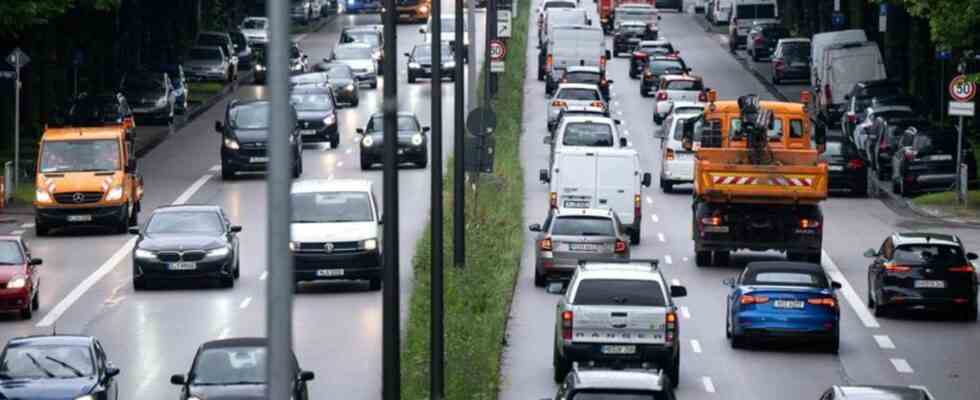climate crisis
Immediate climate programme: Only the transport sector misses targets
Cars drive on the middle ring in Munich during rush hour. The transport sector in particular is still a long way from the climate targets that have been set. photo
© Sven Hoppe/dpa
The immediate climate program is to be decided in the cabinet soon. How does Germany intend to achieve its climate goals by 2030? There is a big problem in the key sector of transport.
The measures planned so far by the federal government are not sufficient to achieve the climate targets in the transport sector by 2030. This emerges from the cornerstones of an immediate climate protection program by the federal government, which became known on Monday from circles in the Federal Ministry of Economics. Accordingly, there would still be a reduction requirement of 118 to 175 million tons of greenhouse gases in the transport sector by 2030, which would not be covered by the measures from the emergency program. Further instruments should be available by spring 2023 to close the gap, it said. In all other sectors, such as buildings or agriculture, the goals would be achieved with the measures planned so far.
As was also learned from the circles, the immediate climate program went into coordination between the ministries this Monday and is to be adopted by the Federal Cabinet in November. The cabinet referral had previously been delayed again due to disagreements between the ministries.
The planned program is intended to enable Germany to meet its climate targets – in particular the target of reducing greenhouse gas emissions by 65 percent by 2030 compared to 1990 levels. All sectors – including the key areas of buildings and transport – must make their own contribution to this. The program defines a roadmap up to 2030 for each individual sector. The first measures should be decided by the end of the year.
Traffic still far from targets
According to a projection report, the total gap in the transport sector will amount to 271 million tons of greenhouse gases by 2030. The measures planned by the end of the year will already significantly reduce this gap, it said. According to the Federal Climate Protection Act, emissions in the transport sector should only amount to 85 million tons of carbon dioxide equivalents in 2030. For comparison: in 2021 they were still 148 million tons. “Against the background of the climate policy failures of the past decades,” it was “not immediately possible in the transport sector to agree on all the necessary decisions in one step,” it said. The transport measures planned so far include the expansion of local public transport, a nationwide electric charging infrastructure and more clean fuels in rail, air and ship transport.
A central point that affects all areas is the accelerated expansion of renewable energies. It is planned that by 2030, 80 percent of the electricity will come exclusively from renewable energy sources, primarily from wind and solar energy. In the building sector, the cornerstones from the house of Robert Habeck (Greens) envisage that from 2024 only those heating systems may be installed that are operated with at least 65 percent renewable energies. In this way, the federal government primarily wants to promote the use of heat pumps.
In industry, greenhouse gases are to be reduced by companies increasingly relying on climate-friendly production methods and technologies. The emergency program is intended to create the legal and financial prerequisites for so-called climate protection differential agreements. With these contracts, the additional costs of climate-friendly production can be secured by the state.
Law is the basis for future savings
The cornerstones of the immediate climate program also contain initial indications for further development of the Federal Climate Protection Act. The Federal Government also intends to decide on the relevant key points on how the law should be revised in spring 2023. The law is the basis for the necessary emission savings in the individual sectors.
The Federal Ministry of Transport described the key points that the Ministry of Economics has now given in the departmental vote as a “good basis for discussion”. Due to the political failures of the past few years, the transport sector “has a lot of catching up to do,” said a spokesman. However, it is important not to “get caught up in the small details of the individual measures”, but to strive for a cross-sectoral overall view. That must also be reflected in the forthcoming revision of the climate protection law, explained the spokesman for the FDP-led ministry by Volker Wissing.
Following on from this, the deputy parliamentary group leader of the FDP, Lukas Köhler, called for the annual sector targets to be completely abolished and for the climate protection law to be reformed accordingly. Habeck’s Ministry of Economics must quickly submit a concrete proposal, said Köhler of the dpa.
Green climate politician Lisa Badum, on the other hand, called on Wissing’s ministry to “finally deliver new measures” for more climate protection in transport. It is “embarrassing” that the ministry is postponing climate protection until next year, Badum told the dpa. There is an urgent need for a reform of the company car privilege and the motor vehicle tax in traffic, she said. Company car privilege means tax advantages for the users of company cars.
The Federation for the Environment and Nature Conservation (Bund) insisted again on the introduction of a speed limit in view of the omissions in the transport sector.

